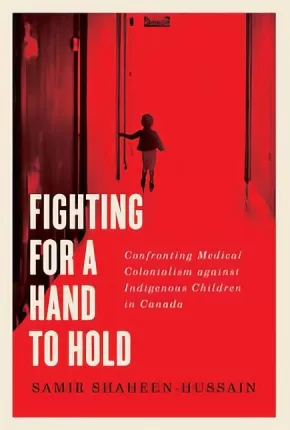Samir Shaheen-Hussain
Samir Shaheen-Hussain is assistant professor in the Faculty of Medicine at McGill University and works as a pediatric emergency physician in Montreal (Tio'tia:ke).
Books (1)
Synopsis:
An exploration of anti-Indigenous systemic racism in Canadian health care and the medical establishment's role in colonial genocide.
Launched by healthcare providers in January 2018, the #aHand2Hold campaign confronted the Quebec government's practice of separating children from their families during medical evacuation airlifts, which disproportionately affected remote and northern Indigenous communities. Pediatric emergency physician Samir Shaheen-Hussain's captivating narrative of this successful campaign, which garnered unprecedented public attention and media coverage, seeks to answer lingering questions about why such a cruel practice remained in place for so long. In doing so it serves as an indispensable case study of contemporary medical colonialism in Quebec.
Fighting for a Hand to Hold exposes the medical establishment's role in the displacement, colonization, and genocide of Indigenous peoples in Canada. Through meticulously gathered government documentation, historical scholarship, media reports, public inquiries, and personal testimonies, Shaheen-Hussain connects the draconian medevac practice with often-disregarded crimes and medical violence inflicted specifically on Indigenous children. This devastating history and ongoing medical colonialism prevent Indigenous communities from attaining internationally recognized measures of health and social well-being because of the pervasive, systemic anti-Indigenous racism that persists in the Canadian public health care system - and in settler society at large.
Shaheen-Hussain's unique perspective combines his experience as a frontline pediatrician with his long-standing involvement in anti-authoritarian social justice movements. Sparked by the indifference and callousness of those in power, this book draws on the innovative work of Indigenous scholars and activists to conclude that a broader decolonization struggle calling for reparations, land reclamation, and self-determination for Indigenous peoples is critical to achieve reconciliation in Canada.
Reviews
"Fighting for a Hand to Hold denounces with ferocity the utterly inhuman, decades-long practice of separating children from their families during emergency medevacs in northern and remote regions of Quebec. In a precise, compelling, and well-documented narrative, Samir Shaheen-Hussain challenges our collective understanding of systemic racism and social determinants of health applied to Indigenous communities most dependent on medevac airlifts and most impacted by the non-accompaniment rule. An eye-opening, tough, and essential book." — Dr Joanne Liu, pediatric emergency physician and former international president of Médecins Sans Frontières
"In Fighting for a Hand to Hold Samir Shaheen-Hussain exposes the social, cultural, and historical structures that allow medical colonialism to hide in plain sight as it harms generations of Indigenous children and their families. It is an unflinching analysis that should be required reading in every medical school in the country." —Maureen Lux, professor, Brock University and author of Separate Beds: A History of Indian Hospitals in Canada, 1920s-1980s
"The memories of the Inuit children I attended as a young interpreter at the Montreal Children's Hospital came flooding back to me. The sad face of a child looking up at me: nurses informed me that he was not speaking, but I immediately recognized the fear in his face, in his eyes. As soon as I spoke to him in Inuktitut, he looked at me in disbelief, but in the next moment his tears began to roll and I could only sound out the Inuit sound of love, 'mmph,' and tell him it would be all right, that his mom or a relative would be arriving soon. I felt for that child, and as he began to relax and open up, we had a lovely conversation in Inuktitut. He did not feel so alone in this strange place he had just been deposited in, as if he were cargo. To this day, I still feel for him. Throughout all these years, we all have been made to believe that this is how things should work. It was one of those things we stayed quiet about for decades. But no longer. We Inuit, we are a people. We love our children. Fighting for a Hand to Hold helps us understand the issues of colonization in the medical system that have vexed us as Indigenous peoples. Today, we Inuit are working to bring our health back to our communities. Healthy communities and families mean self-governance to us, and the decolonization process will happen." - Lisa Qiluqqi Koperqualuk, vice-president of international affairs, Inuit Circumpolar Council Canada
Educator Information
Foreword by Cindy Blackstock, afterword by Katsi'tsakwas Ellen Gabriel
Table of Contents
Figures | xiii
Foreword Cindy Blackstock | xv
Preface and Acknowledgments | xxi
A Note to Readers | xxix
Part One Above All, Do No Harm
Timeline | 3
Introduction | 7
1 Medevac Airlifts in Quebec and the Non-Accompaniment Rule | 16
2 The #aHand2Hold Campaign: Confronting a System | 27
Part Two Structural Fault Lines in Health Care
3 Social Determinants of Health: Equality, Equity, and Limitations | 47
4 Recognizing Systemic Racism: A Social Justice Approach | 66
5 Medical Culture and the Myth of Meritocracy | 90
Part Three Medical Colonialism and Indigenous Children
6 A Little Matter of Genocide: Canada and the United Nations Convention | 113
7 From the Smallpox War of Extermination to Tuberculosis Deaths in Residential Schools | 122
8 Experimental Laboratories: Malnutrition, Starvation, and the BCG Vaccine | 135
9 Cruel Treatment: Indian Hospitals, Sanatoria, and Skin Grafting | 150
10 Gendered Violence: Forced Sterilization and Coercive Contraception | 165
11 Breaking Up Families: Child Welfare Services, Mass Evacuations, and Medical Disappearances | 179
12 Oral Histories and the Narrative of Genocide | 207
Part Four The Structural Determinants of Health and Decolonizing Our Future
13 Capitalism and the Cost of Caring | 217
14 History Matters: Colonialism, Land, and Indigenous Self-Determination | 236
15 Decolonizing Health Care: Reparations before Reconciliation | 253
Conclusion | 271
Afterword Katsi’tsakwas Ellen Gabriel | 277
References | 283
Index | 315
Additional Information
360 pages | 5.98" x 9.01" | 4 maps, 8 illustrations | Hardcover






